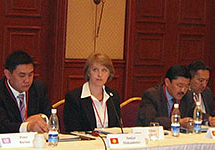October 23, 2007
Workshop Details

Kyrgyz Republic Workshop, Source: Nonproliferation.org
On October 16-17, 2007, a workshop in Bishkek, Kyrgyzstan was conducted on the implementation of United Nations Security Council Resolution (UNSCR) 1540 in the Kyrgyz Republic.
The workshop was a result of recommendations adopted by a regional seminar conducted by CNS in Almaty, Kazakhstan, in October 2006 on implementing UNSCR 1540 in Central Asia and the Caucasus. The Almaty seminar highlighted the need to increase the national capacity of states in the region to implement fully the resolution. It also emphasized the importance of developing national implementation plans, a perspective shared by the Kyrgyz Republic, which expressed a desire to host a national workshop on implementing UNSCR 1540.
The main objectives of the Bishkek workshop were:
- Increase the awareness of relevant Kyrgyz government agencies and experts of 1540 issues, implementation requirements in particular
- Assist in the identification of country-specific needs to fully implement the requirements of Resolution 1540, as well as strategies, mechanisms, and activities to address them
- Facilitate cooperative assistance projects to address the needs
Attendees from Kyrgyz ministries and other government bodies were:
- Ministry of Foreign Affairs
- Ministry of Defense
- Ministry of Economic Development and Trade
- Ministry of Health
- Ministry of Emergencies
- Agency for Environmental Protection
- Customs
Representatives from the following regional countries attended:
- Kazakhstan
- Tajikistan
- Uzbekistan
Officials and experts from outside the region included:
- United Nations 1540 Committee
- Organization of Security and Cooperation in Europe (OSCE)
- European Union
- Canada
- Japan
- Romania
- Russia
- United States
Ambassador Peter Burian, the Chairman of the UN 1540 Committee, gave a keynote presentation on the importance of UNSCR 1540 and emphasized that implementation of the resolution is a long-term process requiring effort and cooperation on national, regional, and international levels. He stated that the seminar in Bishkek is a good example of such cooperation in addressing country-specific needs.
The workshop agenda included presentations on the other countries’ experiences in implementing the resolution and developing national action plans; Kyrgyzstan’s own efforts in implementing Resolution 1540; and nonproliferation assistance and other cooperative programs in Kyrgyzstan and Central Asia. The seminar also featured bilateral consultations between Kyrgyz participants and representatives of donor countries and organizations on ways in which states and international organizations can provide assistance to Kyrgyzstan in implementing Resolution 1540.
Most of the discussion at the workshop focused on specific needs and ways to set priorities to address remaining gaps in the legislative area, export controls, customs, and border controls and in securing nuclear, biological, and chemical materials. This work was aided by an assessment paper on the status of Resolution 1540 implementation in the Kyrgyz Republic (PDF) developed by CNS in advance of the workshop. Kyrgyz participants also presented an independent analysis of the country’s needs and priorities. UN 1540 Committee expert Brad Howlett presented a step-by-step review of 1540 implementation, presenting the matrix developed by the Committee to review national reports and applying it to the information provided by Kyrgyzstan to the United Nations. In his closing remarks, Mr. Marat Usupov, Advisor to the Minister of Foreign Affairs of Kyrgyzstan, stated that the papers and analyses presented at the workshop would serve as a foundation for the activities of an interagency working group and facilitate the development of a set of priorities for a national action plan.
The seminar participants underscored the importance of regional cooperation and the role of regional international organizations, including the OSCE, Shanghai Cooperation Organization, and the Commonwealth of Independent States in implementing Resolution 1540.
Summary of the Workshop: Implementing UN Security Council Resolution 1540
Summarizing the results of the Bishkek workshop, Ambassador Peter Burian thanked the participants for developing a basis for dialogue and partnership between the UN 1540 Committee and Kyrgyzstan. He expects that the workshop will lead to regular consultations between Kyrgyzstan and Committee experts, shape future Committee activities, and serve as an inspiration for other countries in their efforts to implement fully the resolution. Ambassador Burian noted that the work of the Center for Nonproliferation Studies is a laudable example of how NGOs can be involved in facilitating the process of implementing Resolution 1540.
Conducted by:
- James Martin Center for Nonproliferation Studies (CNS)
- Ministry of Foreign Affairs of the Kyrgyz Republic
Sponsored by:
- Norwegian Ministry of Foreign Affairs
- Carnegie Corporation of New York
